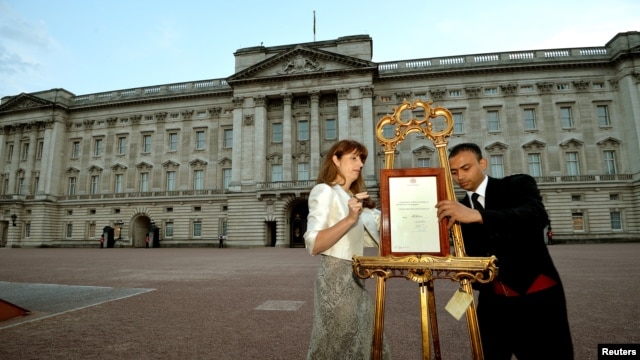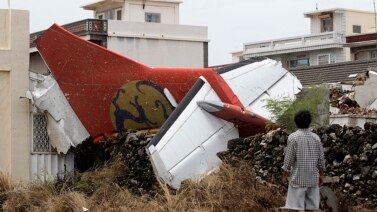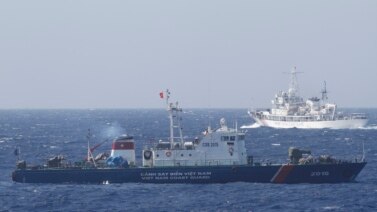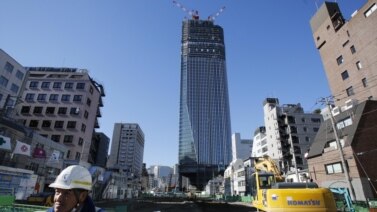
Hi, again! Nice to have you with us on As It Is.
Today we tell the story of a worker at London’s Buckingham Palace. He became famous in announcing the birth of Britain’s Prince George last week. Now, this man is the subject of an international debate.
But first, Mario Ritter takes us to Thailand. A major oil spill there is affecting coastal communities and concerning business investors.
Thailand is still weighing the cost of a 50,000 liter oil spill in the Gulf of Thailand last weekend. The oil leaked from a pipeline in waters about 20 kilometers away from the coast.
The spill has already reached the popular resort island of Koh Samet. And it is moving toward the Thai mainland.
The operator of the pipeline is part of the state-owned energy company, PTT. The pipeline operator has said the leak was closed quickly. And, it says the oil spill will be cleaned up within a few days.
However, Thailand’s Marine Department has made an official protest against PTT. And, Thai officials have called experts from Singapore to help clean up the spill.
Thailand’s tourism and fishing industries are still estimating the total cost of the damage. The cost to the travel industry alone is estimated at about $70 million.
But one observer says it may take weeks to know the full cost of the damage. Sutichai Kumworachai is with Kim Eng Securities. He expects the government to strengthen rules governing the oil industry.
He also says companies may be required to save money to pay for such incidents. And, he says they will have to pay closer attention to the long-term environmental effect of oil spills and other problems.
A representative of the environmental group Greenpeace also spoke about the incident. Ply Pirom is a program manager for Greenpeace South East Asia.
He says he does not believe PTT’s claim that the oil clean-up will be quick. And he is calling for more details about the damage to the environment.
“From what happened we can say that this is a good example and alarming to the Thai Government that we are not ready for such an incident.”
Greenpeace has asked the Thai government to reexamine its energy policy and dependence on fossil fuels, like oil and natural gas. The group also wants the government to end oil drilling and exploration in the Gulf of Thailand.
The Environmental Engineering Association of Thailand offers another solution. Its president, Prasert Tapaneeyangkul, says oil companies need to limit human errors.
“Most of the time it’s not from the engineering design or construction, but by human being error so that is one of the most important things that first of all must be eliminated.”
In 2009, an oil spill and gas leak by a PTT company in the Timor Sea took 74 days to stop. It is considered one of Australia’s worst oil disasters.
I’m Mario Ritter.
A large crowd waited outside Buckingham Palace in London last month for the British royal family to officially announce the birth of Prince William and Kate’s baby. Millions more watched on television.

Finally, on July 22, a young Indian man carried the birth notice across the palace grounds. He placed it on a decorated golden stand.
But few of those watching knew the amazing story of the young man who carried the notice. He is 25-year-old Badar Azim.
Mr. Azim grew up in the streets of Kolkata, India. He was educated at an orphanage, a center for children whose parents are dead. The school eventually raised $15,000 to send him to work for Britain’s royal family.
But just a few days after he placed the birth notice on the stand, Badar Azim’s job at Buckingham Palace ended. His visa was not extended. And so he returned to India.
His story has increased attention on the British visa system. Last year, the government proposed restrictions to make immigration harder. The restrictions mean that students can stay in Britain only if they find an employer to sponsor them, or if they earn enough money.
Another Indian student, Arjun Sathe, was lucky. He found a job after completing business school.
“Everyone pretty much underestimated the reluctance to sponsor a graduate. And essentially people didn’t expect that it would be that difficult.”
The mayor of London, Boris Johnson, spoke against the visa restrictions last year when he was visiting India.
“I think we need to be very careful that we’re not doing stuff that actively deters foreign students.”
The British government said the restrictions prevent the student visa system from being abused. But many British businesses criticized the changes. Universities say payments from foreign students are worth almost $4 billion.
Nicola Dandridge is head of Universities UK, a group representing higher education institutions. She says the restrictions hurt the country.
“These are highly skilled people, many of whom we’d like to stay in this country and do highly skilled jobs. So there is this question of us losing talent in the UK, which we can ill afford to do.”
But Britain appears to be adding new restrictions. It is planning to require visitors from six countries – India, Pakistan, Bangladesh, Sri Lanka, Nigeria, and Ghana – to pay $4,500 for a visa bond.
In a statement, the government said it wants to make sure foreigners do not stay too long. And, it wanted to recover costs if a non-citizen used Britain’s public services.
India has called the measure a step backwards.
And that’s As It Is. I’m Kelly Jean Kelly.
Thanks for joining us today. If you would like reach us, send an email to learningenglish@voanews.com. Or go to our website at learningenglish.voanews.com and click on “Contact Us.”





